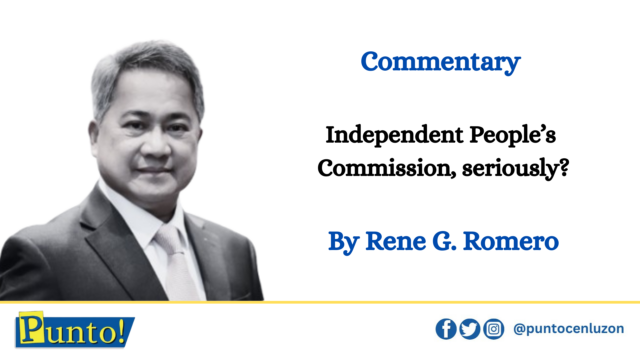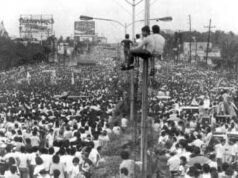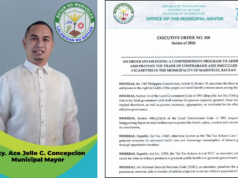I WATCHED the news about the proposal of Senate President Tito Sotto to create another investigative body, the so-called Independent People’s Commission. This proposal comes at a time when the Independent Commission for Infrastructure (ICI) recently created by President Bongbong Marcos has yet to fully take off and deliver its mandate. Before the ICI can even present substantial findings, another body is now being proposed to take over or absorb its work.
This development raises a serious question: How many investigative bodies do we need before we actually get results?
Let us not forget that the House of Representatives was the first to investigate the anomalous DPWH flood-control projects. Then came the Senate Blue Ribbon Committee, which conducted its own inquiry but failed to conclude it properly. What the public witnessed during those hearings was not statesmanship but political theater, grandstanding, personal attacks, and open conflict between the Senate and the House over the testimonies of witnesses. Instead of complementing each other in the pursuit of truth, they seemed more concerned about who gets the political credit or media attention.
The investigation must be swift, accurate, and credible. Unfortunately, what we see now in the Senate is the opposite, committee chairmanships of the Senate Blue Ribbon Committee being exchanged several times, a clear sign of disunity and political maneuvering rather than teamwork for the people. This is alarming because it shows a breakdown of unity among those who are supposed to uphold integrity and accountability. When the very institutions that should safeguard truth and justice are divided, the public inevitably loses faith in the entire process.
Our government officials across the Legislative, Executive, and Judiciary, must unite and act decisively. They must put aside political rivalries and personal interests and work together with urgency to resolve these pressing issues. Justice delayed is justice denied; and if these investigations continue to drag on without tangible results, public frustration will deepen. When people lose confidence in their leaders and institutions, they may be compelled to take actions that none of us would want to see happen. History reminds us that when government fails to deliver justice, people eventually demand it in their own ways.
Adding to the people’s frustration, the ICI itself has worsened the situation by attempting to keep its investigative processes hidden from public view. Instead of showing transparency, it appeared to shield its proceedings from scrutiny, which only fueled the anger and suspicion of the people. It is now evident that these overlapping investigations and new commissions may have been designed to cover the truth about the results of earlier inquiries, a deliberate attempt to confuse the public and diffuse accountability. Such actions betray the very purpose of these institutions, which is to protect the public interest and uncover wrongdoing.
Now, faced with growing public pressure, the ICI seems to be bowing down to the demand for openness. This is a clear reminder that in today’s environment, transparency is not optional, it is essential. The people have lost trust in government institutions, and the only way to rebuild that trust is through honesty, openness, and genuine accountability.
It is now imperative that every move of the government be done with full transparency and sincerity. The people deserve to see the truth unfold, not behind closed doors, but in the open, where accountability can be verified. If this trust is not restored soon, the credibility of government itself will collapse, and as the saying goes, “we will be going to the dogs”. The erosion of trust in government is not just a political crisis it is a national emergency that can destabilize society, weaken institutions, and drive both citizens and investors away.
The government must realize that corruption is not just a moral or political issue, it is now an economic and diplomatic threat. Many local and foreign investors are already withdrawing or hesitating to do business in the Philippines because of the perception and reality of widespread corruption. Even government-to-government partnerships for development are now being halted or delayed because foreign governments are losing confidence in our ability to ensure clean and transparent use of public funds. This is a dangerous signal that could isolate the Philippines from much-needed international cooperation and funding.
At this point, one cannot help but suspect that these overlapping investigations, and now, this new proposal are simply designed to delay the truth or divert public attention. It has been months since the issue erupted, yet no clear results have been presented. The public’s patience is wearing thin. People are beginning to lose faith in the sincerity of government institutions that claim to be seeking accountability and reform.
What the people demand is simple but powerful: truth, reform, accountability, and lasting transparency.
Government officials and private contractors involved in these irregularities must face consequences, administrative, civil, or even criminal. The only way to restore trust in our system is through concrete results, not endless investigations and political performances.
And let us not forget the DPWH is only one department under scrutiny. Many believe that other departments may be facing similar, if not worse, issues of corruption and misuse of funds. If we cannot even fix one, what hope is there for the rest?
At this stage, the three branches of government—the Executive, the Senate, and the House of Representatives appear disjointed and uncertain about how to move forward. Instead of collaborating to produce credible results, they seem caught in political competition and self-preservation.
The Filipino people deserve better. The government must act with unity, sincerity, and political will. Enough of the endless creation of commissions, committees, and councils. What we need is one credible, independent, and transparent body that will see this investigation through without interference, without bias, and without delay. Only then can we begin to rebuild public trust and restore the moral and institutional foundation of governance in our country.





